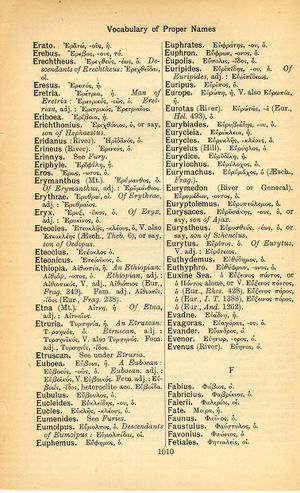Fabius
κινδυνεύει μὲν γὰρ ἡμῶν οὐδέτερος οὐδὲν καλὸν κἀγαθὸν εἰδέναι, ἀλλ᾽ οὗτος μὲν οἴεταί τι εἰδέναι οὐκ εἰδώς, ἐγὼ δέ, ὥσπερ οὖν οὐκ οἶδα, οὐδὲ οἴομαι· ἔοικα γοῦν τούτου γε σμικρῷ τινι αὐτῷ τούτῳ σοφώτερος εἶναι, ὅτι ἃ μὴ οἶδα οὐδὲ οἴομαι εἰδέναι. → for neither of us appears to know anything great and good; but he fancies he knows something, although he knows nothing; whereas I, as I do not know anything, so I do not fancy I do. In this trifling particular, then, I appear to be wiser than he, because I do not fancy I know what I do not know.
English > Greek (Woodhouse)
Φάβιος, ὁ.
Latin > English (Lewis & Short)
Făbĭus: a,
I the name of a Roman gens, concerning which see Liv. 2, 48-50; among its distinguished members were,
1 Fabius Pictor, a historian, Cic. de Or. 2, 12.—
2 Q. Fabius Maximus Cunctator, the famous dictator in the second Punic war, Prop. 3, 3, 9; Liv. 22 passim.—
3 M. Fabius Quintilianus, author of the rhetorical work Institutiones Oratoriae, Aus. Prof. 1, 7; Mart. 2, 90. —
4 Paulus Fabius Persicus, consul under Tiberius, A.U.C. 786, Sen. Ben. 2, 21, 4; Juv. 8, 14.—
II Hence,
A Făbĭus, a, um, adj., of or belonging to a Fabius, Fabian: lex, de ambitu and de plagiariis, Cic. Mur. 34, 71; id. Rab. Perd. 3, 8; Dig. 48, tit. 15; ib. 17, 2, 51: fornix, a triumphal arch, built by Q. Fabius Maximus Allobrogicus on the Sacra Via, in the neighborhood of the Regia, Cic. Planc. 7, 17; called also Fornix Fabii, id. de Or. 2, 66, 267; and Fornix Fabianus, v. under B.: lupercus, Prop. 4 (5), 1, 26; cf. under B.: tribus, one of the rural tribes, Hor. Ep. 1, 6, 52.—
B Făbĭānus, a, um, adj., the same: fornix, i. q. Fabius fornix (v. above), Cic. Verr. 1, 7, 19; also called arcus, Sen. Const. Sap. 1: Fabianae artes, i. e. delay, Liv. 22, 34: ‡ Fabiani et ‡ Quintilian appellabantur luperci, a Fabio et Quintilio praepositis suis, Paul. ex Fest. p. 87 Müll. —Subst.: Făbĭāni, ōrum, m., persons of the Fabian tribe, Suet. Aug. 40; also the soldiers of Fabius, Nep. Iphicr. 2, 4.
Latin > French (Gaffiot 2016)
Făbĭus,⁷ ĭī, m., nom d’une célèbre famille romaine (gens Fabia) ; nott : Fabius [qui institua les Luperques sous Romulus : Prop. 4, 1, 26

